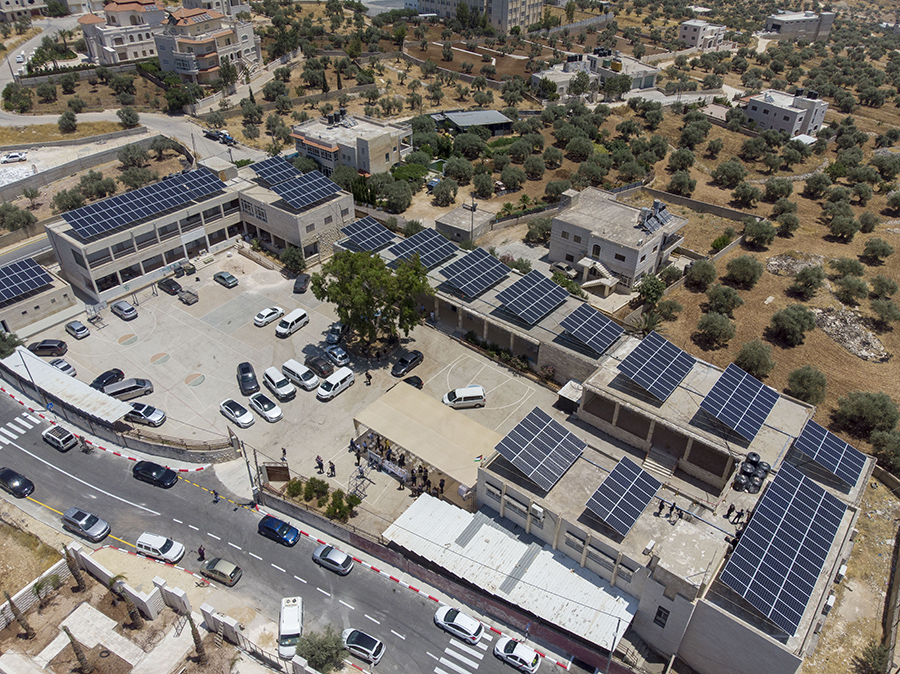World Bank Project Funds Climate-Friendly Solar-Powered Schools in Palestine
March 25, 2021
The Finance for Jobs (F4J) project in Palestine has awarded a grant enabling the installation of solar rooftops on 400 schools across the country, creating a total of 28 megawatts of generating capacity. The DAI-led project is funded by the World Bank through the Ministry of Finance. The rooftop-solar installation is the largest electricity generation project in Palestine.
The F4J grant will go to Massader for Natural Resources & Infrastructure, the company that will develop the project over four years. Not only will the project provide schools with clean, reliable, and free electricity, it should create around 600 jobs in the West Bank.
The funding—a blend of public and private finance—comprises a $15 million investment from Massader, an International Finance Corporation (IFC) loan of $8.9 million, and IFC blended finance of approximately $8.9 million. F4J has complemented the investment cost with a $2 million grant, leveraging private capital.
F4J’s mandate is to address constraints to job growth in the West Bank and Gaza by developing innovative financing instruments that promote business investment and job training. For F4J, Massader’s solar schools project offers a unique combination of positive results:
- Creating jobs and establishing a new set of engineering, accounting, and finance skills in the renewable energy sector that are currently not found in the Palestinian marketplace;
- Reducing debt for the Ministry of Education and Higher Education; and
- Aligning with the Palestinian strategy to substitute energy sources with more reliable and greener energy.
New Jobs
Installing the rooftop solar systems will create jobs for sheet metal workers, electricians, and engineers. The European Photovoltaic Industry Association estimates that generally speaking, each megawatt installed creates from 15 to 27 jobs, depending on the technology involved. For this particular project investment, it is estimated that some 600 jobs will be created, of which more than 60 percent will go to young people and about a quarter to women.

Closing the Energy Shortfall
Palestine’s mounting energy security challenges are expected to escalate further given the projected growth in electricity demand and limits on the existing power supply, which comes primarily from Israel. This situation is exacerbated by high tariffs. Electricity prices clock in at roughly $0.14-0.18 per kilowatt/hour—the highest among all Middle Eastern countries.
In addition to its over-reliance on external sources, the Palestinian energy sector is constrained by an inefficient grid system with high losses and unreliable supply—the Palestinian Energy Authority estimates that at least 7 percent of the West Bank has no continuous supply, while rural areas are not connected at all—and by a weak and fragmented institutional framework.
“The constrained electricity supply is a major hindrance to development in Palestine,” said Mazen Asad, F4J Project Manager. “It has a crippling effect on the competitiveness of Palestinian industries—along with other factors, such as restrictions on movement and access to natural resources.”
Massader’s solar rooftop venture alone will provide 23 percent of Palestine’s renewable energy target, substantially reducing the energy gap. “This project constitutes the first landmark initiative for the inclusion of public infrastructure in renewable energy projects at a grand scale and sets an example for regional innovation,” added Asad.
RELATED CONTENT:
Evaluation Shares Lessons Learned from DAI-Led Water Project in Indonesia
A recent report that evaluated the sustainability of a DAI-led water resources and natural resource management program in Indonesia from 2004 to 2010 has shown that the majority of the partner water utilities continued to experience success after the donor-funded project ended.
Read More